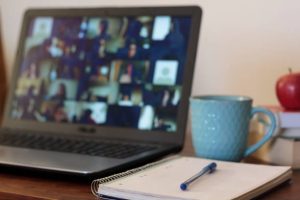It is common for us researchers to get absorbed by our respective fields. Sometimes getting out of this bubble requires introspection and effort. I think that even within laboratories there is a lack of connection, and it appears as if several interests do not entirely align. This is especially true in the case of outreach activities in science. Now let us imagine how things would play out when we talk about our research to people belonging to other socio-economic backgrounds. Add age difference to the mix, and things quickly get even more complicated. The truth is we should think about these disparities more often, but this is not the first thing that comes to mind when talking to children, unless of course you have previous experience with them.

Many people from academia think that restricting ourselves to a certain level of teaching is convenient at this stage in our careers. I totally understand this point, given our work hours and many, many responsibilities, but on a fundamental level I disagree. The reason being that focusing too much time on a certain environment makes you lose your perspective about how things are done around you. Please do not get me wrong, I am not advocating for a herculean schedule combining every kind of activity under the sun. Two hours per year spent on something different are sufficient to achieve a broader perspective: I know this first-hand. Now, if I have awoken your curiosity, how does someone from the university engage in that type of activity? For me, it happened after a chance encounter…
When I first took a look at a colleague’s CV – I recommend this to get ideas and improve one’s own CV, as well as giving help to colleagues, as not everything comes from divine inspiration – several communication/outreach options appeared, combining written, visual, and other forms of media. I noticed a line mentioning the webpage ‘Skype a scientist’ (https://www.skypeascientist.com/), which caught my eye. Briefly, this site allows researchers to get involved in high school sessions (most frequently in the USA, as this is where the page is located) where you can select the subject, level, and your availability. Then you wait. Fortunately, in my case, I did not have to do so for long. One week after my offer I already had more than four petitions appear in my inbox. After contacting the teachers, and giving a brief demonstration of my expertise, I ended up with two exciting opportunities. We agreed on a lesson plan, a date, and then we were good to go.
For my first talk I was supposed to delve into macroalgae and coastal ecosystems for a class of eighth graders (ages 13 to 14) belonging to a high school on the US Pacific coast. I prepared what I thought were funny and entertaining slides, following the teacher’s instructions based on my academic life, my current projects, and my connection to coastal ecosystems. I thought my plan was flawless. Every bit of requested info was there, and I even had a few jokes in my arsenal to make everything easier to digest…. Boy, I was so wrong. I will just say that what I encountered through the screen resembled more to a den of two-month-old German Shepherds – including the associated attention span. I did everything I could to attract their gaze but failed miserably. It was only when I talked about accidents and funny stories from my PhD that I could see their eyes focused on the screen. After 50 minutes of this, I decided to cut my losses, thanked everyone for the invitation and left. I raised concerns about my performance to the teacher but 4 months later, her answer has not reached me. Time for self-reflection.

I realized several mistakes following this first try, but my main takes were that high schoolers generally require more stimulus, and some degree of interaction should be included in lessons to help keep them engaged with the topic. I prepared accordingly for my second attempt: all my info, while dense, was encased in a series of funny stories, without reaching the point of stand-up comedy. In addition, I also included several quizzes, questions, and cognitive exercises. The noise was significantly lower this time and since I received enthusiastic feedback from the supervising teacher, I guess I – mostly – got the hang of it.
My personal take from this experience is that, while preparing the appropriate material for different education levels is important, the way the students receive it can mark the difference between a memorable and an easily forgettable session. Since nowadays researchers must be good communicators, as well as scientists, administrators, psychologists, PR advocates, repair people, and community managers, this lesson is a valuable one. I hope I remember everything when I repeat the experience next year (remember – I already ticked my two sessions off the list).
Juan.

Be First to Comment